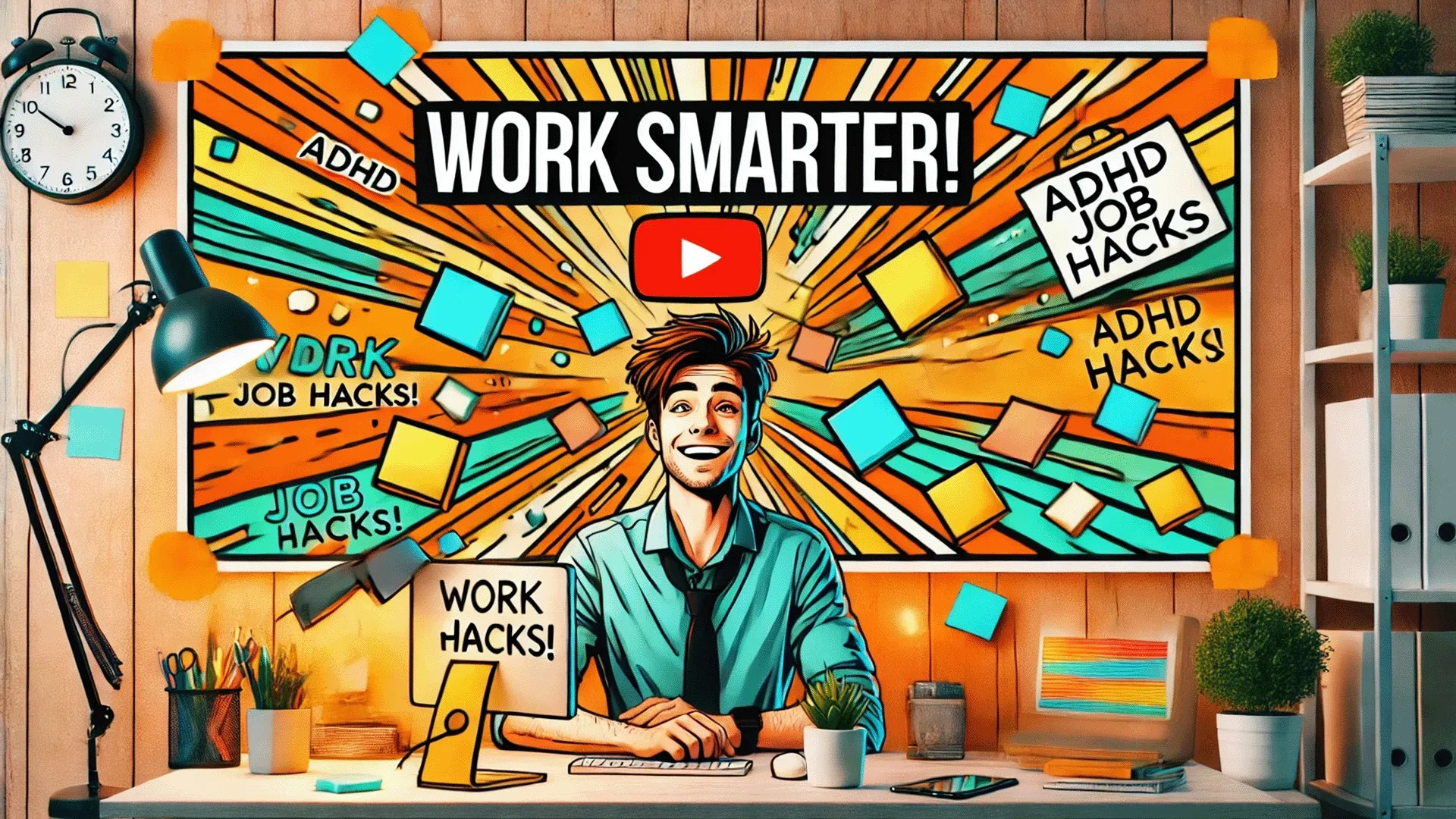Breaking the Myths Around ADHD and Careers Attention Deficit Hyperactivity Disorder (ADHD) is often misunderstood, especially in the context of
Breaking the Myths Around ADHD and Careers
Attention Deficit Hyperactivity Disorder (ADHD) is often misunderstood, especially in the context of careers. If you’ve ever thought, “I just need a list of ADHD-friendly jobs, and I’ll figure it out,” you’re not alone. However, the reality is far more complex—and exciting! Your career success isn’t about fitting into a predefined list; it’s about understanding your unique ADHD traits and how they can become your biggest strengths.
In this article, we’ll explore how ADHD affects career choices, the four key topics that come up in every ADHD discussion (medication, natural remedies, decluttering, and disclosure), and why finding the right career is not just important but transformative. Plus, we’ll dive into real-world strategies to help you thrive in a job that aligns with your talents and passions.
What Makes ADHD Unique in the Workplace?
ADHD isn’t a one-size-fits-all diagnosis. It manifests in different ways—hyperactive, inattentive, or combined—and each subtype brings its own strengths and challenges. Understanding how your ADHD traits influence your behavior at work is the first step toward building a fulfilling career.
Here’s what we know:
- ADHD is Multifaceted:
ADHD consists of 18 core symptoms, and no two individuals have the same combination. Your unique “flavor” of ADHD impacts how you work, communicate, and solve problems. - Strengths of ADHD at Work:
- High energy and creativity.
- Ability to hyperfocus on tasks of interest.
- Thriving in fast-paced, high-stakes environments.
- Challenges of ADHD at Work:
- Difficulty with routine tasks and long periods of focus.
- Struggles with organization and time management.
- Sensitivity to criticism and rejection.
Topic 1: Understanding ADHD and Medication
Medication is one of the most common questions during ADHD discussions. It’s also one of the most controversial. While medication isn’t a cure, it can help regulate some of the symptoms that make work challenging. However, it’s not the only solution.
Should You Take Medication for ADHD?
Medication can:
- Improve focus and reduce impulsivity.
- Help manage emotions and social interactions.
- Enhance productivity in structured environments.
But it’s only part of the puzzle. Many people combine medication with other strategies like therapy, coaching, and workplace accommodations.
Topic 2: Natural Remedies for ADHD at Work
If medication isn’t for you, or you’re looking to complement it, there are natural ways to manage ADHD symptoms and excel in your career:
- Exercise: Physical activity boosts dopamine and serotonin levels, which can improve focus and mood.
- Diet: High-protein, low-sugar diets can help stabilize energy and concentration.
- Mindfulness and Meditation: These practices can improve emotional regulation and decision-making.
- Sleep: Prioritize rest to keep your mind sharp and resilient.
Topic 3: Decluttering Your Work Life
ADHD and clutter go hand-in-hand. Physical and mental clutter can derail productivity, but decluttering isn’t just about tidying up—it’s about creating a system that works for you.
Quick Decluttering Tips:
- Start Small: Focus on one desk drawer or a single task list.
- Use Visual Aids: Color-coded calendars, labeled folders, and sticky notes can make organization ADHD-friendly.
- Set Time Limits: Use a timer to avoid getting overwhelmed.
- Enlist Help: Coworkers, friends, or even a professional organizer can provide fresh perspectives.
Your Depression Has Been in Control Long Enough!
Topic 4: Who Should You Tell About Your ADHD?
Disclosure is a deeply personal decision. While sharing your ADHD diagnosis can lead to better accommodations and understanding, it can also expose you to stigma.
Pros of Disclosure:
- Access to accommodations like flexible deadlines or quiet workspaces.
- Building trust with employers and coworkers.
- Advocating for ADHD-friendly workplace policies.
Cons of Disclosure:
- Potential bias or misunderstanding.
- Risk of being unfairly labeled as “unreliable” or “difficult.”
To navigate this decision, consider your workplace culture, your comfort level, and the potential benefits of disclosure.
The Importance of Finding the Right Career
Of all the topics discussed in ADHD presentations, finding the right career is often the most critical—and the most challenging. For individuals with ADHD, the wrong job can feel suffocating, while the right one can unlock unparalleled potential.
Why ADHD People Struggle With Careers:
- Pressure to fit into rigid, one-size-fits-all jobs.
- Difficulty navigating traditional career paths that require years of schooling or routine work.
- Fear of failure or rejection from past experiences.
How to Identify ADHD-Friendly Careers
Instead of searching for a definitive list of “ADHD-friendly jobs,” focus on understanding your strengths, challenges, and passions.
ADHD Strengths to Look for in a Job:
- Variety: Jobs that offer changing tasks and environments.
- Creativity: Opportunities to brainstorm, innovate, or design.
- Energy: Roles that match your high-energy personality.
- Crisis Management: High-pressure situations where you can hyperfocus and excel.
Common ADHD-Friendly Careers:
- Creative fields: Acting, writing, graphic design.
- High-stakes roles: Emergency medicine, trial law, firefighting.
- Dynamic environments: Teaching, entrepreneurship, sales.
- Solo work: Freelancing, long-distance trucking, or research.
Jobs to Avoid (or Approach With Caution):
- Repetitive roles with little variation (e.g., data entry, toll collection).
- Highly structured environments with rigid rules.
- Jobs that require extended periods of quiet focus.
Real-Life Stories: Thriving in ADHD-Compatible Careers
Rick Green’s story is a testament to the power of finding your niche. Starting as a comedian, he eventually transitioned into advocacy, using his ADHD traits—energy, humor, and adaptability—to excel. His career wasn’t linear, but it was uniquely his own.
Lessons from ADHD Professionals:
- Tailor your environment to your strengths.
- Leverage support systems, from mentors to technology.
- Embrace the quirks of ADHD as assets, not liabilities.
Your Career Roadmap: Step-by-Step Guide
- Understand Your ADHD: Learn your subtype and how it affects your work style.
- Explore Careers: Use resources like the Dictionary of Occupational Titles to understand job tasks.
- Test the Waters: Try internships, part-time work, or shadowing before committing to a field.
- Seek Guidance: Career counselors, ADHD coaches, and mentors can provide valuable insights.
- Adapt and Adjust: Be open to change as you discover what works for you.
Conclusion: Turning ADHD Challenges Into Career Superpowers
Finding the right career with ADHD isn’t about overcoming your symptoms—it’s about embracing them. The key is understanding your unique strengths and using them to carve out a career that feels fulfilling and sustainable.
So, whether you’re drawn to the adrenaline of a fast-paced job, the freedom of self-employment, or the creativity of the arts, remember: ADHD doesn’t define your career—it enhances it.


